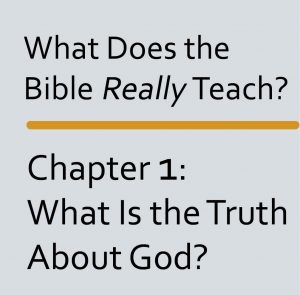So far, I have discussed the first three topics in Chapter 1 of “Bible Teach.” Today, I’ll move on to the next subject.
Topic #4: How to draw close to Jehovah
Paragraph 18 (p. 15) of Chapter 1 is headed, “Can You Be Close to Jehovah?” Paragraph 19 (p. 16) quotes Jesus as saying in John 17:3, “This means everlasting life, their coming to know you, the only true God, and the one whom you sent, Jesus Christ.”
Interestingly, an earlier edition of the Watchtower Bible and of “Bible Teach” renders that verse differently: “This means everlasting life, their taking in knowledge of you, the only true God, and the one whom you sent forth, Jesus Christ.”
If they quote the earlier edition at any point, you can ask, “Which is it? To me, there’s a big difference between taking in knowledge of someone and actually knowing that person. How do you see that?”
Try to get them to express their views them on this subject. They need to see for themselves that getting close to the Father and the Son is a matter of a personal rather than organizational relationship.
Witnesses often use John 17:3 as a proof text against the deity of Christ. The argument is that Jesus himself said that the Father is “the only true God.”
I don’t recommend getting into that at this juncture unless the Witnesses insist on it. If you can, save that discussion for Chapter 4, which is about the identity of Jesus.
However, the Witnesses may insist on talking about that verse at this point, so it’s wise to be prepared. I discuss how to deal with that argument in The Jesus Is the God-Man Approach (pp. 163-164, 172-173) from my book, Getting Through to Jehovah’s Witnesses: Approaching Bible Discussions in Unexpected Ways.
In brief, you can ask them if the Father being “the only true God” means that Jesus is a false god? Also, when Jude 4 calls Jesus “our only owner and Lord” (Watchtower translation), does that mean the Father is not our owner and our Lord? The point is that those verses weren’t written to describe the interrelationship between the Father and the Son. They were written to distinguish the Father and Son from all other “gods” and “lords.”
Paragraphs 20-21 (p. 16) of “Bible Teach” say that the more we learn about Jehovah, the more we will come to understand why the Bible teaches us to think of him as our loving Father. But then in paragraph 21 (pp. 16-17) it says, “The Bible also teaches that humans can become Jehovah’s friends.”
You can ask, “What is my relationship with God supposed to be? Is he just my friend or is he my loving Father? There’s a big difference.”
In reality, the Watchtower teaches that only 144,000 anointed Jehovah’s Witnesses have God as their Father, while all the rest have him only as a friend. This will be the case until the end of Christ’s millennial reign, at which time those who pass the final test will be adopted as God’s children.
I don’t think this is a good stage at which to get into the Watchtower’s two class salvation system, nor do I think Witnesses want to do so at this juncture. However, just asking the questions about Father or friend might help the Witnesses see that according to Watchtower doctrine, they don’t really have the intimate Father-child relationship with God that the New Testament offers.
Topic #5: Resisting opposition to studying with Jehovah’s Witnesses
Paragraph 22 (p. 17) explains that well-meaning people may urge you to stop studying the Bible out of fear that you may change your beliefs, but it urges you to continue your study in order to become Jehovah’s friend.
If people do try to dissuade someone who is studying with Witnesses from becoming a Jehovah’s Witness, I can testify from my own experience that statements like this can be a powerful tool to keep you headed in the Watchtower’s direction by making its writers look very knowledgeable—even prophetic.
The chapter concludes by telling you that the best way to learn about Jehovah is to examine the Bible, because the Bible is unique.
That’s a good statement to use as a springboard to ask, “Then why are we studying this book? If the Bible is unique and the best source, why don’t we just study the Bible itself?”
You can repeat this theme when you get into Chapter 2 of “Bible Teach”—“The Bible—A Book from God.”


Leave a Reply
1 Comment on "How Close Can We Get with God?"
On the point WT that warns others will try to dissuade someone from studying with JWs. Not only does the warning make WT look prophetic and knowledgable it also bolsters the paranoid idea that the real Christians will be opposed indeed persecuted. Therefore if JW Bible students get opposition to studying then it must mean WT is the true religion! Ha ha.